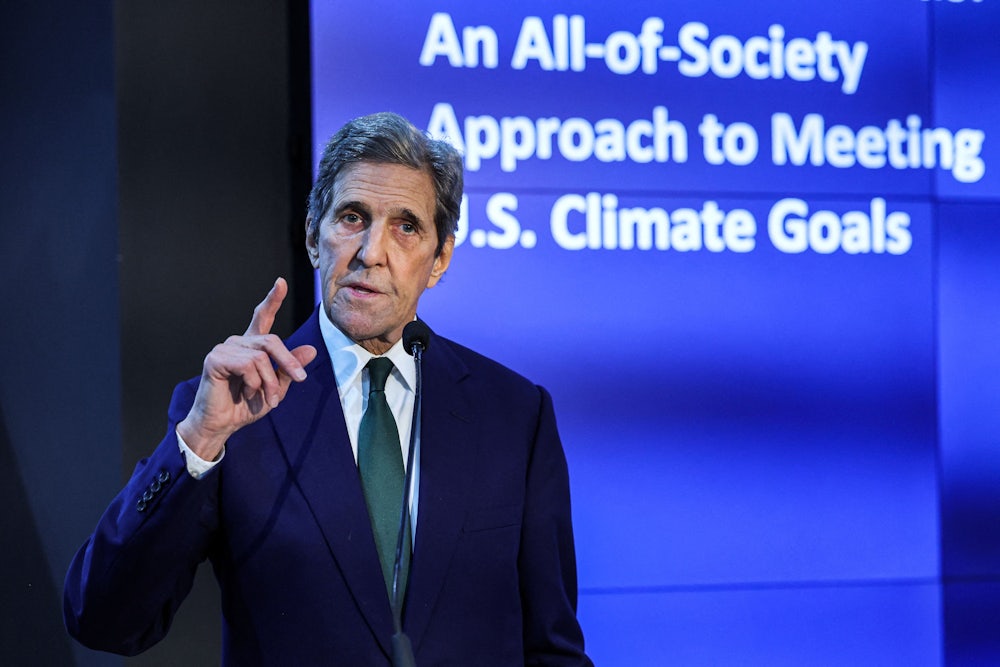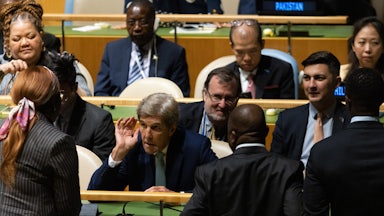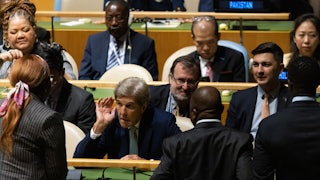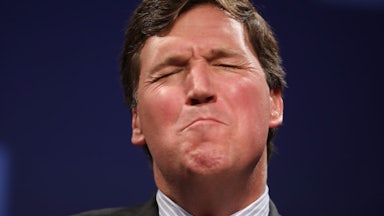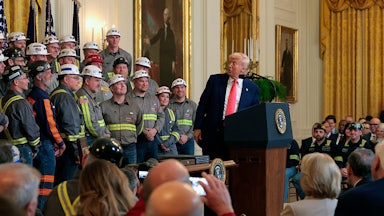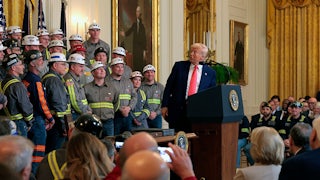In the early hours of the morning in Sharm El Sheikh, Egypt, where this year’s U.N. climate talks (COP27) are being held, results from elections halfway around the world started to pour in. Voters in the United States—the world’s largest historical greenhouse gas emitter and second-largest emitter today—were deciding how much power they would hand to a party dead set against just about anything called climate policy. Control of the House and Senate is still to be determined as of this writing, though Democrats fared much better than expected. While Republicans falling short is certainly a relief, veterans of the COP process—particularly from the global south—aren’t holding their breath for the remaining votes to be counted. The last several decades of climate talks have shown that U.S. Congresses and administrations controlled by different parties have more in common with one another on global climate policy than Americans would like to think.
“The only difference I see is whether they are in the process or out of the process,” says Meena Raman, legal adviser and senior researcher at Third World Network. “In a Democratic presidency you see a willingness to do much more on climate in the U.S., but whether they are willing to do much more on climate change internationally remains to be seen.” U.S. negotiating teams at international climate conferences have cycled through a similar cast of characters through the Obama, Trump, and Biden administrations. In broad strokes, their negotiating positions behind closed doors remain relatively steady too, albeit with changes in emphasis. “I don’t see any big shift in their stance at all,” Raman told me by phone from the Sinai Peninsula conference center where COP27 is being held, noting that U.S. intransigence on climate finance has held steady. But the difference of whether the United States is in or out of the Paris Agreement is a major one, and a Republican taking over the White House again in 2024—and likely withdrawing from it again—would be “absolutely disastrous,” she said.
For about as long as international climate negotiations have existed, the U.S. has taken up a few reliable positions regardless of who’s in charge. In particular, U.S. negotiators have blocked any proposal that might put them on the hook for providing compensation for climate damages. For years, they have pushed back on even having official conversations about “loss and damage”—U.N.-speak for funds to recover from the fires, floods, sea-level rise, and displacement that climate change causes. That the U.S. delegation discussed the issue last year and has agreed to have it added to the official agenda at this year’s COP27 is seen as a major sign of progress, although Raman was skeptical it would support the concrete financing mechanism that a united bloc of developing countries has been advocating for.
“People are watching these midterm elections with so much anxiety because they’re looking into the future,” said Harjeet Singh, head of global political strategy at Climate Action Network-International. A GOP takeover means that “obstruction continues with more intensity, which lowers the ambition,” he said. “At the same time, whatever little money is coming from the U.S. is off the table.”
The Paris Agreement is itself, in many ways, a product of the limitations of U.S. domestic politics. In 1997, the Senate voted unanimously (95–0) for a resolution stating the U.S. would not sign onto the binding agreement scheduled to be ushered out later that year at U.N. climate talks in Japan, known as the Kyoto Protocol. The Clinton administration did sign on but did not put it to a ratification vote in Congress, fearing backlash. George W. Bush eventually withdrew entirely, during his first year in office. A number of other countries followed suit, and negotiators were sent back to the drawing board to hash out an agreement that the U.S. and others who left would participate in. The 1997 resolution, though, known as the Byrd-Hagel resolution, had severely restricted what the world’s second-largest emitter would and would not accept in any future pact.
In line with a founding principal of the U.N. Framework Convention on Climate Change, or UNFCCC—establishing the “common but differentiated responsibility and respective capabilities” of different countries to address the issue—the Kyoto Protocol established a distinction between Annex I and Annex II countries, designating developed and developing nations, respectively. The former would be committed to reduce greenhouse gas emissions. The Byrd-Hagel Resolution—both of whose Republican sponsors received generous donations from corporate polluters—committed the U.S. to opposing this principle in all future treaties. It stipulated that the U.S. would not sign on to any pact that would require emissions cuts from richer countries but not poorer ones, nor any that “would result in serious harm to the U.S. economy.” It added that any future agreement requiring Senate ratification should be accompanied by “an analysis of the detailed financial costs which would be incurred by, and other impacts on, the U.S. economy.” This all helped set the stage for the Paris Agreement, where emissions are reduced through voluntary pledges (“Nationally Determined Contributions”) from every country.
While there’s still more than a week to go at COP27, Team America appears to be sticking mostly to these 1997 principles, continuing to oppose a dedicated financing facility for loss and damage. The European Union has taken a similar stance against “discussing this issue of liability and compensation,” though several EU member states have now pledged to put money toward loss and damage in recent days. Discussing funding for adaptation on Wednesday, the U.S. delegation advocated deleting a reference to developed and developing countries and changing a line soliciting contributions to the U.N. Adaptation Fund from “invites developed country Parties” to “invites all Parties.” These are the quieter and more behind-the-scenes forms of U.S. obstruction—as opposed to the Trump administration’s more blunt-force approach—that have helped delay international action on climate for decades.
“The U.S. always acted in bad faith. It’s not a problem with the system,” Singh told me, referring to the UNFCCC. “It’s how countries like the U.S., and led by the U.S., did not allow the system to work. They have systematically lowered the ambition.” That the need for climate financing is so great now—it’s estimated to reach $2 trillion per year by 2030—is a direct result of the lack of progress so far. “People are suffering because of 30 years of inaction and [the U.S.] is blocking action now by not letting us develop an institutional mechanism to support people right now and in the future.”
Another U.S. withdrawal from Paris would be devastating largely because of how destabilizing it could be for the UNFCCC process itself—“the only multilateral regime that can hold governments to account” for their emissions, as Raman described it. “The world cannot move forward limiting temperature rise without the participation of the U.S.,” she said, noting the possibility that a GOP-controlled U.S. that pulls the country out of the Paris Agreement would have “free license to pollute.”
“I wish it were different. I wish whether the U.S. is involved or not didn’t make a difference, but it does,” Raman said, referencing its position as the world’s second-largest emitter. Singh echoed that concern: “If this process is killed, where do we go?”
Another through line in the U.S. approach, regardless of whether Democrats or Republicans are at the helm, has been an enduring support for so-called market-based mechanisms to do everything from reduce emissions to finance a clean energy future. Special climate envoy John Kerry doubled down on this approach this year when he announced a new, private-sector-driven carbon trading scheme called the Energy Transition Accelerator. “We’re very glad that the U.S. is back. But we are very afraid that this false solution of carbon markets is going to be the center of these negotiations,” said Javier Dávalos González, a senior attorney for the climate program at the Interamerican Association for Environmental Defense, who is based in Quito, Ecuador. He was enthusiastic about the Inflation Reduction Act’s sizable investments in clean energy, as well as the Biden administration’s whole-government approach to climate, including in foreign policy. Still, old habits die hard. “Something that repeats regardless of the administration is the focus on carbon markets and carbon credits,” he said. “I think this is something the U.S. will be enforcing no matter the changes that happen politically.”
What’s needed, climate justice advocates have repeatedly argued, is dedicated, direct funding from wealthy countries for mitigation, adaptation, and loss and damage—not trading schemes or loans, which still account for upward of 70 percent of the public climate financing, per Oxfam. “The U.S. has got money to funnel billions into Ukraine to fight the war, but when it comes to the climate crisis you don’t see the same commitment. It’s always about the developing world needing to depend on the private sector,” Raman told me. Just 4 percent of private climate finance has gone to Africa.
The U.S. presence at the UNFCCC is best characterized as an extension of its foreign policy—which has always bucked against any restraints international institutions might impose—rather than its domestic climate policy. While the rhetoric from individual administrations might shift, actual policy has been remarkably consistent through changes in government, thanks to a stubborn and thoroughly bipartisan consensus about the role of the U.S. in the world. It’s striking, then, that despite that consistency, COP veterans are virtually unanimous that a Trumpian Republican taking over the U.S. in 2024 would be disastrous. That’s less an endorsement of Democrats’ global climate leadership than a testament to how much worse things could get if they lose control.
